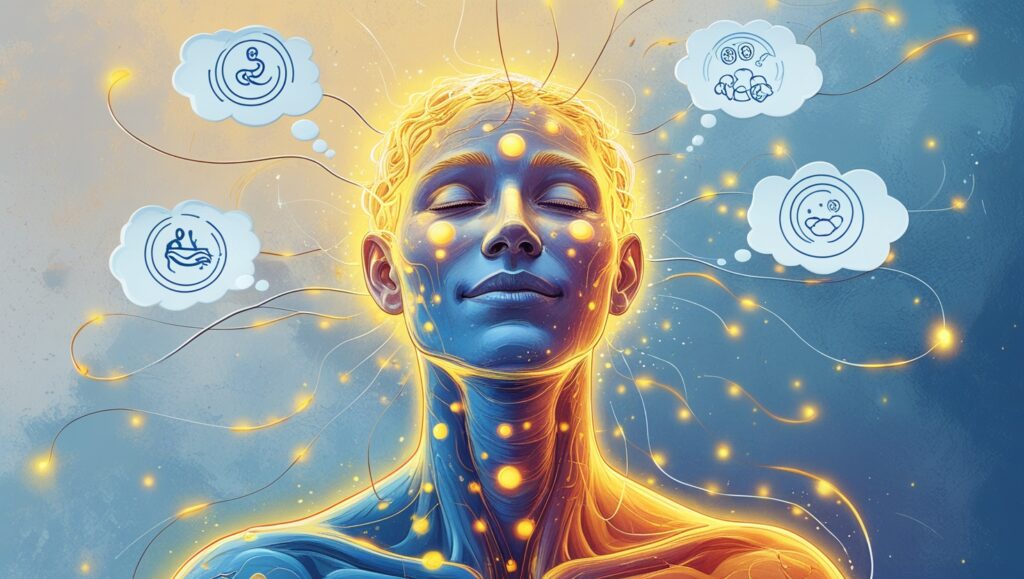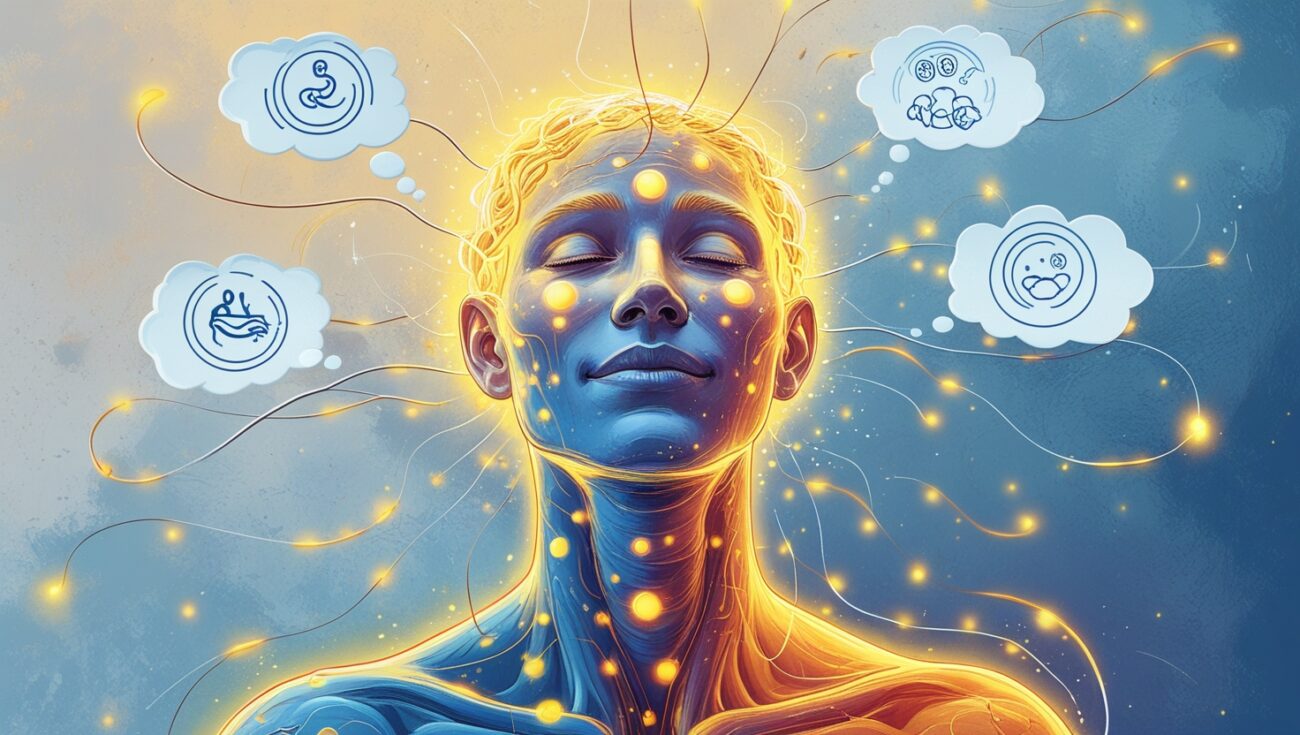How Cellular Energy Impacts Your Hormones, Sleep, and Stress
Most people think energy is just about feeling awake, but it’s much deeper than that. Your cellular energy—produced by tiny powerhouses called mitochondria—plays a major role in regulating your hormones, sleep cycles, and stress response. If you’re feeling exhausted, emotionally off, or sleeping poorly, it’s time to look at what’s happening inside your cells.

Table of Contents
What Is Cellular Energy and Why Does It Matter?
Every cell in your body needs energy to function, especially your brain, endocrine (hormonal), and nervous systems. Cellular energy is generated through a process called ATP production, fueled by mitochondria. When mitochondrial function is low, everything slows down—including your metabolism, hormonal balance, and ability to cope with stress.
Hormones and Mitochondria: A Two-Way Relationship
Hormones like cortisol, estrogen, testosterone, and thyroid hormones are deeply connected to mitochondrial performance. If your cells aren’t producing enough energy:
Your thyroid can become sluggish
Your stress hormones may stay elevated
Your sex hormones can become imbalanced
This can lead to mood swings, low libido, irregular cycles, fatigue, and weight gain.
Why Chronic Stress Drains Your Cells
When you’re under stress, your body releases cortisol, which increases energy demands. If your mitochondria can’t keep up, your body burns out, leaving you more anxious and fatigued. This is why people with adrenal fatigue or burnout often benefit from mitochondrial repair supplements.
The Cellular Link to Sleep Problems
Your brain relies on ATP to regulate melatonin and sleep-wake cycles. Poor mitochondrial function = disrupted sleep. If you’re struggling with:
Waking up between 2-4 AM
Feeling wired but tired at night
Needing naps daily
…you may be running on empty at the cellular level.
My Experience: Fixing My Cells Fixed My Sleep
I didn’t expect sleep to improve so quickly. After just two weeks of taking a mitochondrial support supplement, I was falling asleep faster and waking up rested.
Here’s the exact one I used: Try it here
It contains:
CoQ10 and PQQ for energy and regeneration
Acetyl-L-Carnitine for brain performance
Magnesium for relaxation and stress support
Cellular Energy Affects Your Mood, Too
Low ATP affects neurotransmitters like serotonin, dopamine, and GABA. That’s why fatigue often comes with anxiety, sadness, or brain fog. Boosting your cellular energy doesn’t just improve physical performance—it helps you feel emotionally balanced and mentally sharp again.
Signs Your Hormones and Energy Are Out of Sync
Fatigue that doesn’t improve with rest
PMS or cycle changes
Trouble focusing or remembering things
Anxiety or irritability
Midday crashes
Poor sleep or insomnia
If you check more than two of these, your mitochondria likely need support.
Cellular Stress Can Trigger Hormonal Chaos
When mitochondria are stressed, they release signals that disrupt normal hormonal feedback loops. This can throw off your thyroid, adrenal glands, and reproductive hormones. The good news? Repair your cells, and many symptoms improve naturally—without needing synthetic hormone treatments.
How to Support Cellular Energy Naturally
Here’s what worked best for me:
Daily mitochondrial supplement this one worked for me
Eating enough healthy fats (omega-3s, avocado)
Reducing processed sugar
Light morning movement and sun exposure
Magnesium-rich foods (spinach, pumpkin seeds)
Cellular Health = Hormonal Balance = Better Life
When your body has the energy to run smoothly, your hormones regulate themselves, your sleep resets, and your mind calms down. This isn’t about adding more to your routine—it’s about giving your cells what they need to thrive.
Final Thought
You don’t need to guess anymore. If you’ve been stuck in a cycle of poor sleep, hormonal symptoms, and stress, the root might be your cellular energy.
Click here to try the supplement that changed everything for me
Your hormones and mood don’t have to be out of control. Sometimes, it starts with fixing your energy at the source.
The Hidden Cause Behind Hormonal Fatigue
Many people chase hormone panels and prescriptions when the real issue is mitochondrial burnout. Your adrenal glands rely heavily on cellular energy to produce cortisol and DHEA. When your cells are depleted, adrenal fatigue symptoms appear—low energy, cravings, irritability—even when your labs look “normal.”
Can ATP Production Affect Your Thyroid Health?
Yes. Your thyroid is like your body’s thermostat—but it needs strong mitochondria to function properly. Low cellular energy often leads to hypothyroid-like symptoms: cold hands, weight gain, and brain fog. Mitochondrial support can help improve thyroid conversion (T4 to T3) naturally.
How Stress Wrecks Your Sleep Through Cellular Exhaustion
Cortisol isn’t just a stress hormone—it’s also tied to your circadian rhythm. When your body is under chronic stress and your mitochondria are struggling, cortisol becomes dysregulated, keeping you awake at night and tired all day. Recharging your cells helps restore this rhythm.
The Best Supplements to Support ATP and Hormones Together
Look for formulas that combine PQQ, CoQ10, Acetyl-L-Carnitine, and Magnesium. These ingredients support ATP production and hormone function at the same time.
Here’s the one I use daily — it made a major difference in my mood, focus, and sleep.
How Cellular Health Supports Female Hormonal Balance
For women, mitochondrial stress can mean irregular periods, intense PMS, or low libido. By increasing energy availability, your body can better regulate progesterone, estrogen, and cortisol, leading to more consistent cycles and reduced symptoms of estrogen dominance.
For Men: Testosterone and Cellular Energy Are Linked
Men struggling with fatigue, low drive, or poor workout recovery might be dealing with low ATP production, not just low testosterone. Healthy mitochondria directly influence testosterone synthesis, motivation, and endurance. Supporting them can improve all three.
Why Most “Hormone Balancing” Products Miss the Root Cause
Many hormone supplements treat symptoms, not the root energy imbalance. If your cells are still underpowered, those herbs won’t fix much. Supporting mitochondrial function creates the foundation your hormonal system actually needs to regulate itself.
Natural Ways to Reduce Stress by Targeting the Cells
Instead of only using meditation or journaling (which help), add cellular-level stress support by:
Getting 20 minutes of morning sunlight
Walking after meals
Taking magnesium glycinate before bed
Supporting ATP with this supplement
Signs You Might Be in Cellular Burnout (Not Just Tired)
You crash after small amounts of stress
You need caffeine to get going
Sleep doesn’t make you feel rested
You feel “wired and tired” often
These are clues your mitochondria are taxed—and your hormones are trying to overcompensate.
Mitochondrial Support Can Help with Perimenopause and Menopause
During hormonal transitions, mitochondrial decline becomes more obvious—night sweats, fatigue, mood shifts. Supporting energy production at this stage can ease symptoms and help you navigate menopause with more energy and mental clarity.
Boosting Mitochondria for a Calmer Nervous System
Your parasympathetic nervous system (the rest-and-digest side) functions better when your cells aren’t constantly stressed. When ATP levels are stable, your body exits fight-or-flight mode more easily, reducing anxiety and emotional reactivity.
Reclaim Your Energy from the Inside Out
Fixing your energy at the cellular level doesn’t require 10 different pills or expensive treatments. One high-quality supplement, paired with smart habits, can begin to reverse years of hidden energy debt.
Start with the one that worked for me here and let your body reset from the inside out.

